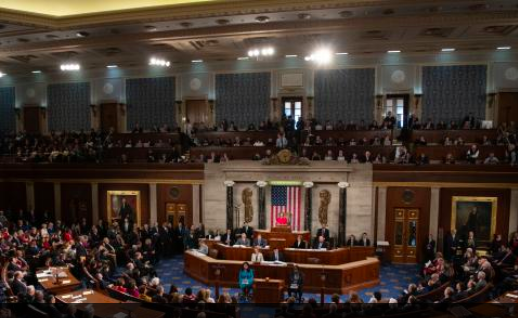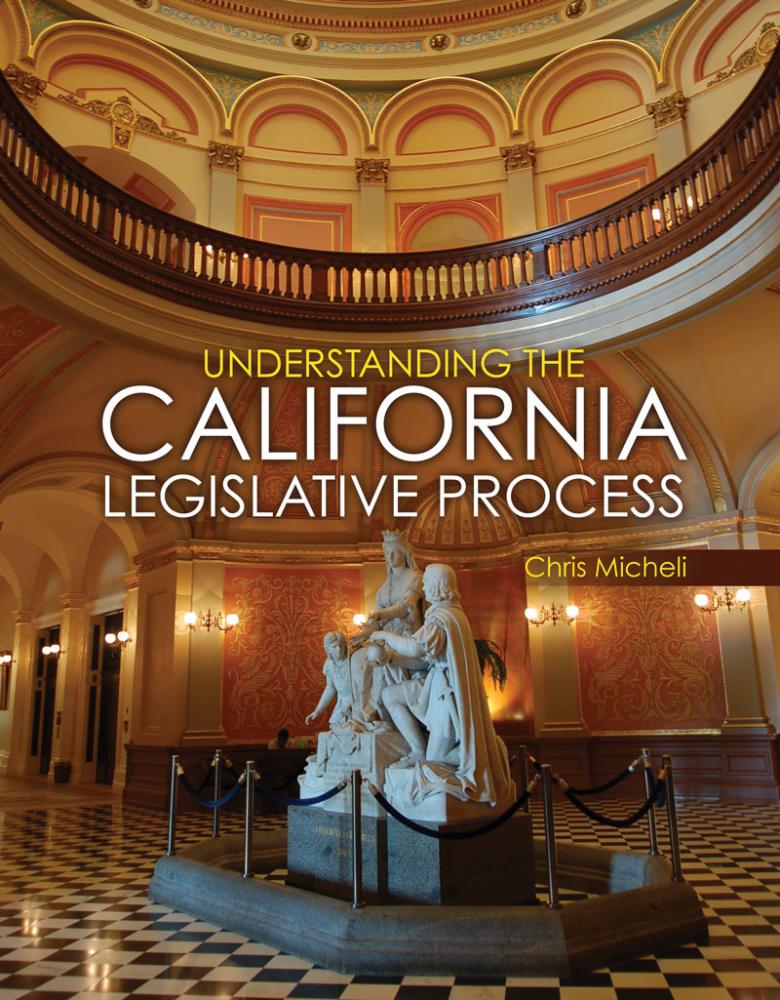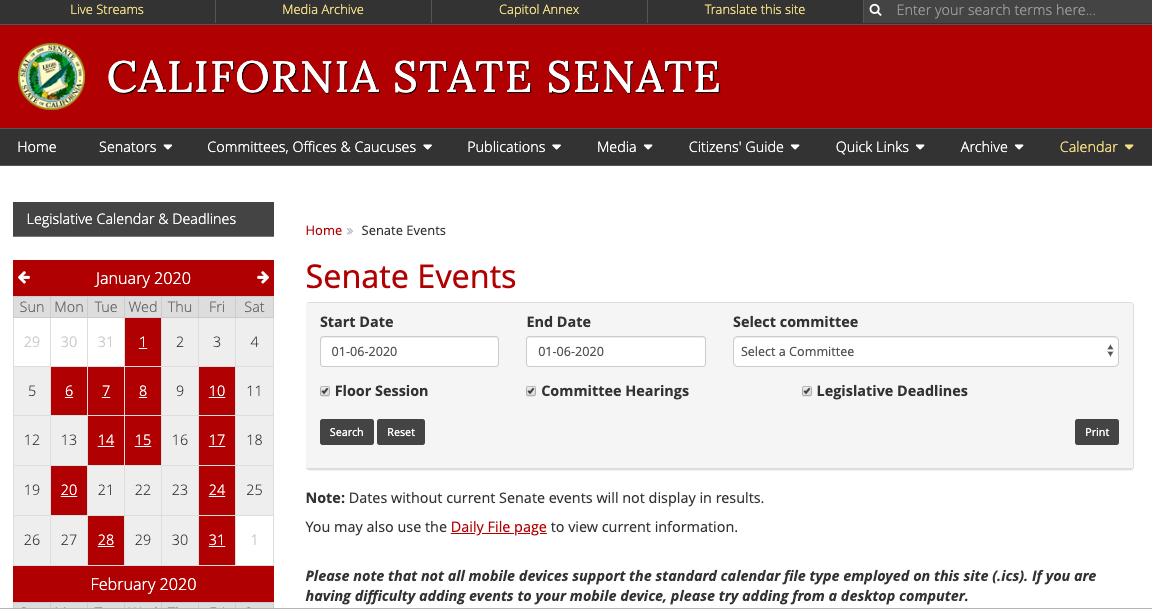
Congress (Photo: House.gov)
Reflecting on Differences Between Legislative Processes: Congress v. California Legislature
In Congress, bills are rarely given a hearing
By Chris Micheli, October 28, 2019 6:03 am
Having worked in both Washington, DC and Sacramento, I am often asked about the differences in the two legislative processes. California’s Legislature is obviously based upon the federal legislative branch and, as you would expect, they share many things in common. Nonetheless, their specific rules for the legislative are different.
We can answer the “differences” question in broader terms to appreciate some of the major distinctions between the federal legislative process and the state legislative process. This brief article is my take on some of those major distinctions.
Bills
In both the Congress and the California Legislature, legislators can introduce any bill they would like. However, in Congress, bills are rarely given a hearing. In the Legislature, basically everything gets heard. A bill may die at its first hearing, but at least there was a public hearing on the measure. It would be extraordinary if a California legislator were denied a hearing on his or her bill. A committee chair may do so, but that is not a custom and practice of either house.
To appreciate this point, take a look at the numbers: During an average 2-year session of Congress, about 10,000 bills are introduced. Roughly 80% of those are referred to committee without any further action. About 4-5% get signed into law. As such, while thousands of bills are introduced each year in Congress, most do not get a hearing, let alone a vote.
In contrast, during an average 2-year session of the California Legislature, about 4,500 bills are introduced. Roughly 45% of these bills reach the Governor’s Desk and about 85% of those get signed into law (meaning more than a third get signed into law after introduction). Clearly, in California, opportunities for hearings and votes are a predominant aspect of the process.
Sponsored Bills
All bills in Congress are “sponsored” because that is the term they use for the author of the bill (i.e., the Member of Congress). On the other hand, in the California Legislature, “sponsor” means the individual or group that brought the bill idea to the legislator. The legislator who authors the bill is called the “author.” This use of terminology is critical in either Capitol city.
Committee Hearings
In Congress, federal legislators conduct committee “mark-up sessions” on bills and can spend a good amount of time going line-by-line reviewing bill language. In the Legislature, almost no amending occurs in a committee hearing and debate is usually limited to the policy arguments for and again a measure. That is probably because they have to hear so many bills.
In the California Legislature, the general practice is to attempt to work out bill amendments before the hearing. If and when disputes arise in committee, they may be worked out in the context of the public committee hearing. Members of the committee (or the committee’s analysis of the bill) may suggest amendments, which the author can usually accept or reject. The author can also ask that the vote be postponed and the bill be brought back to the committee for a future hearing and vote.
In contrast, Congress uses the public hearing to gather information—including support and opposition—regarding a bill, but amendments and revisions are not immediately decided upon in the context of that hearing. Instead, bills that are expected to receive majority support go through a process called “mark up.”
Here, in a subsequent meeting, members of the committee and their staff go through the proposal in detail and decide on appropriate changes. Each particular amendment or revision is voted up or down, and the committee also votes on whether to send the bill forward with amendments, or whether to table or postpone action.
Importantly, while the mark-up session is generally open to the public, the sessions are conducted without testimony or participation from outside parties, including the author (if not a member of the committee) or interest groups for and against the bill.
Record of Proceedings
California does not have anything like the Congressional Record, which is essentially a verbatim transcript of Congressional proceedings. While committee hearings and floor sessions in the Legislature are videotaped, and available to order, the Senate Daily Journal and the Assembly Daily Journal do not include transcripts of debates or statements made by legislators. Instead, they merely document the major actions taken on legislation. As such, there are definite limits on documentation in the Legislature related to determining legislative intent.
Calendar
The California Legislature is bound by its calendar and the deadlines for bills to be introduced, heard in committee, considered by the respective houses, and to the Governor. This is similar to most legislatures, whether they are part-time or full-time sessions. Congress, on the other hand, convenes through the calendar year, every year, and with large chunks of time out of Washington.
The practical implication of this is that, absent rule waivers, bills in the Legislature must move through the process according to those calendar deadlines whereas, in Congress, bills can be introduced and considered throughout the year without concern for any deadlines in general.
Omnibus Bills
California pretty well follows its germaneness rule, meaning that bill amendments have to relate to the main subject of the bill as introduced. On the other hand, Congress enacts most policy changes through omnibus spending measures often with entirely unrelated subject matter scattered through the bill. Although more policy is getting done in the state budget process, those policy changes are still contained in single, related subject matter bills.
Vote Requirements
In both Congress and the Legislature, vote requirements matter, but really only in one house of Congress – the Senate. In Congress, most legislation (with the exception of an override of the President’s veto and a few other limited measures) only needs a simple majority to pass. One might conclude that Congress has an easier job of passing legislation, but this is not the case because of rules regarding debate.
Generally speaking, the rules of the U.S. Senate and the House of Representatives enable legislative leaders to structure and limit debate more than in the California Legislature. The major exception occurs with the rules of the Senate, where floor debate is virtually unlimited. Historically, this has led to use of the “filibuster” where members bring the operations of the Senate to a standstill though endless debate of a proposal.
The only way to limit debate when faced with a filibuster is through a “Motion for Cloture.” which requires a three-fifths (3/5th) vote. Thus, unless 60 Senators vote to limit debate, the use of the filibuster can prevent a measure from ever coming to a vote. Effectively, this means on many occasions that a bill cannot really pass the Senate unless it has 60 votes. As such, a block of just 41 Senators can prevent a bill from passing the Senate.
On the other hand, the California Constitution specifies many kinds of legislation that require a supermajority (two-thirds) vote, including: tax increases, most appropriations bills, proposals to amend the California Constitution, urgency bills, and a vote to override a Governor’s veto, plus many other related to specific laws (e.g., amendments to the Political Reform Act require a super majority vote).
Direct Democracy
The U.S. Constitution does not provide for the initiative or referendum processes. However, the California Constitution allows for both forms of direct democracy. As such, the people can propose statutes and constitutional amendments for consideration on the statewide ballot through use of an initiative, and they can repeal most laws (with a few exceptions) adopted by the Legislature and Governor through use of a referendum.
- Corporate Securities Law of 1968 - February 8, 2026
- Deposit of Unclaimed Property in California - February 8, 2026
- Is There a Funding Requirement for Prop. 36? - February 7, 2026




